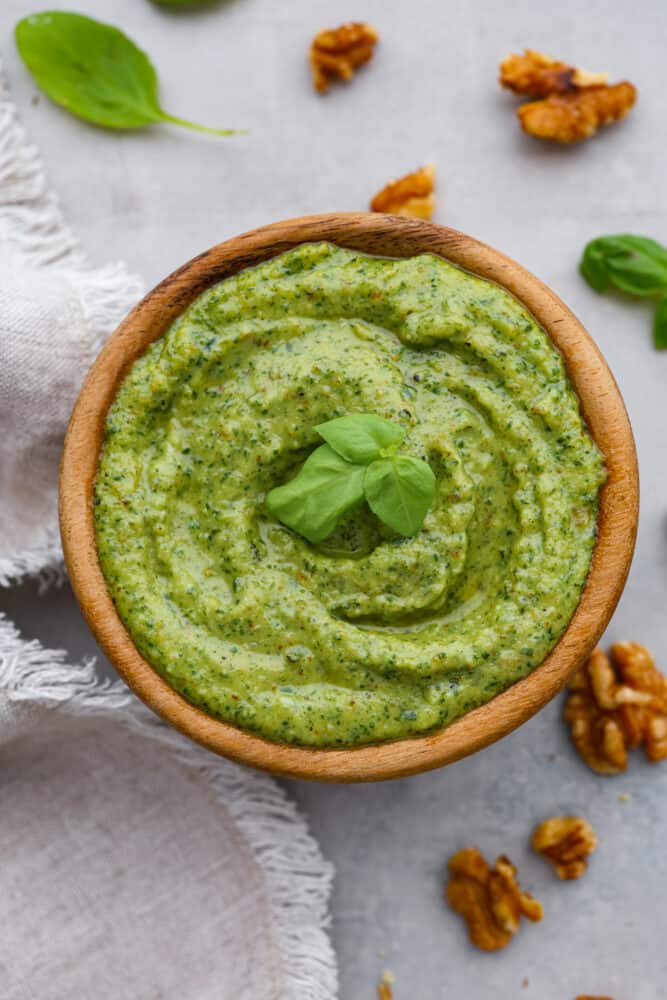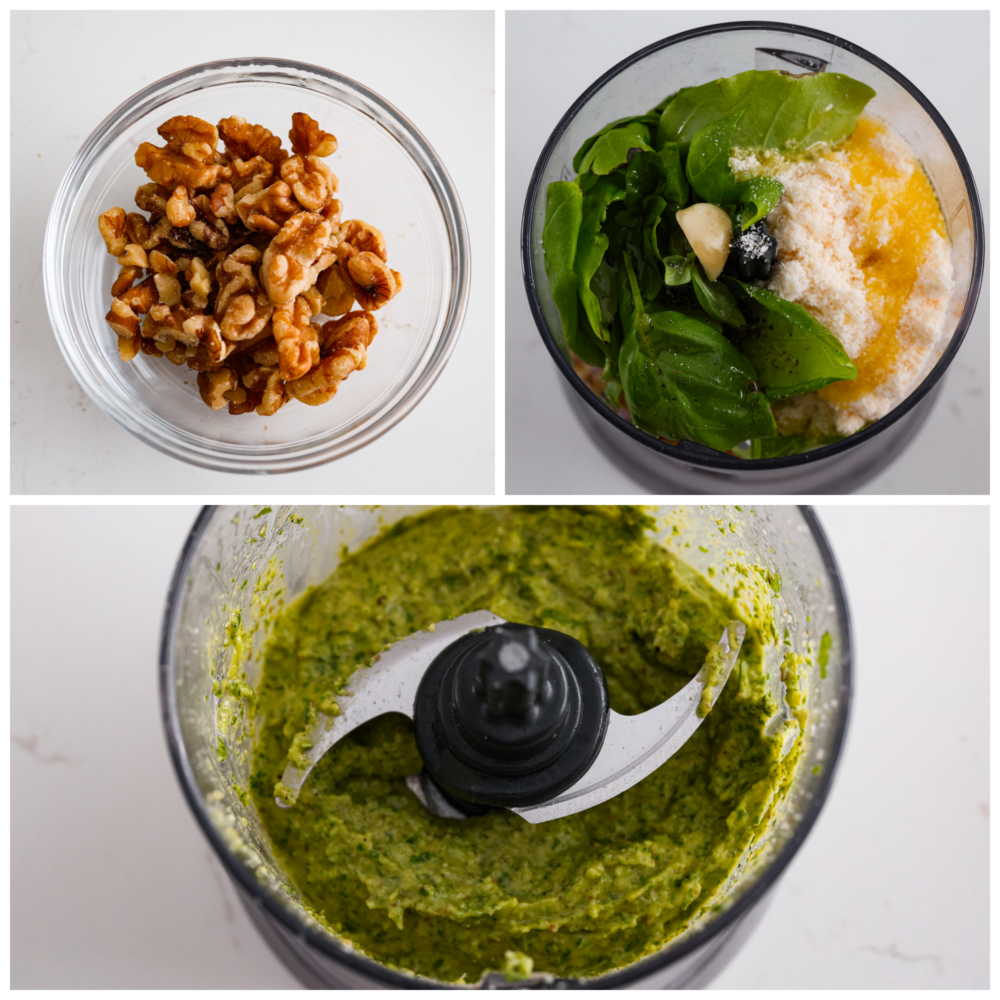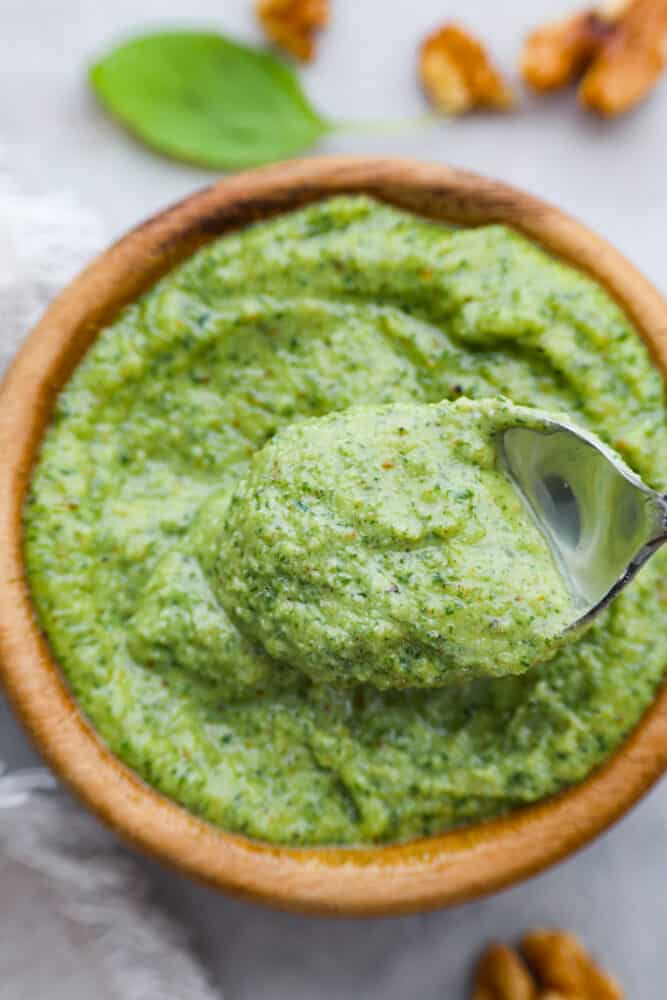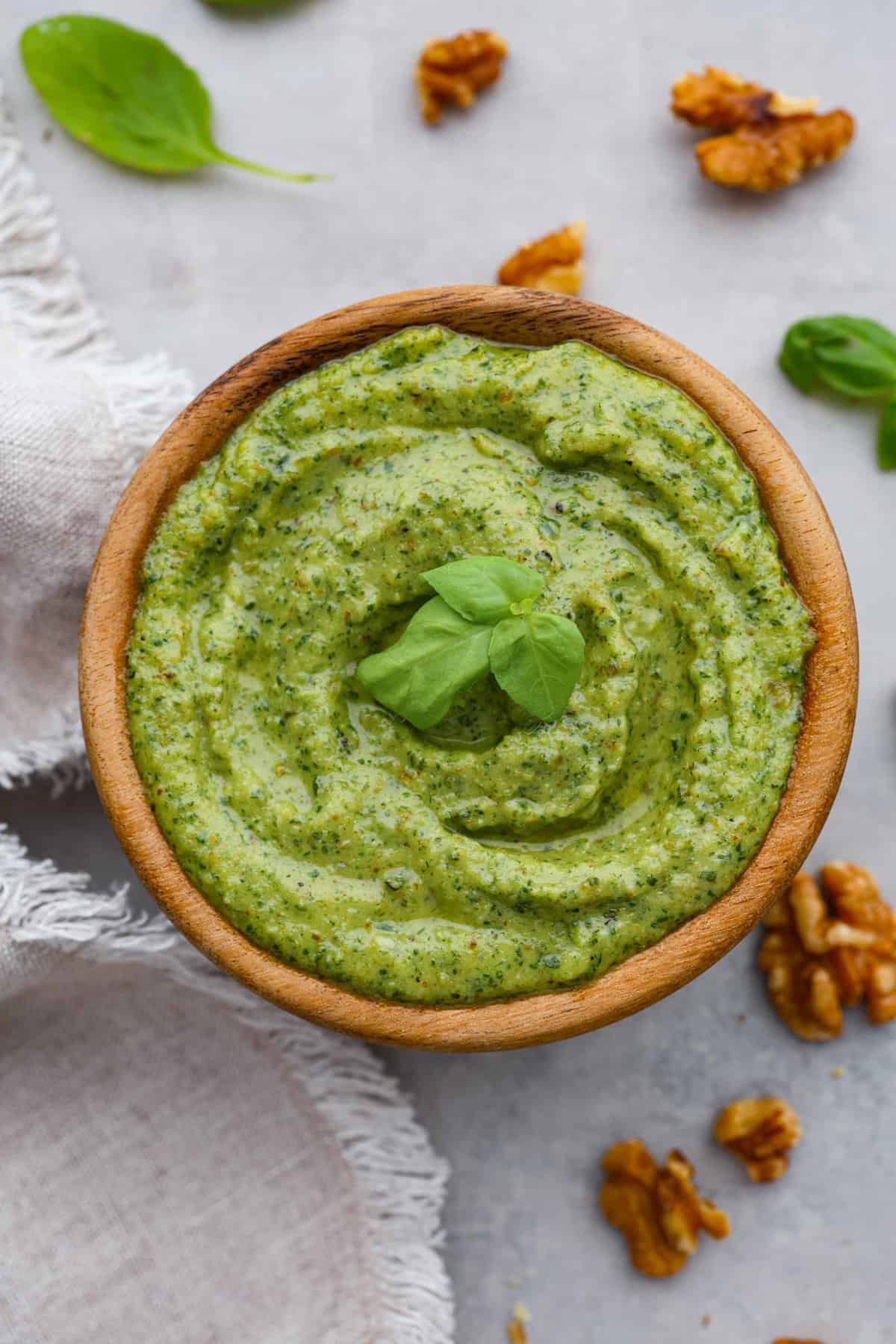This website may contain affiliate links and advertising so that we can provide recipes to you. Read my privacy policy.
Move over, traditional basil pesto, there’s a new nut in town! Walnut pesto is the perfect combination of earthy, nutty goodness with just the right amount of zing. You won’t want it any other way. Spread it on chicken, toss it with pasta, or even eat it by the spoonful- no judgement here!
It’s probably pretty clear by now that pesto is one of my favorite Italian dishes. It’s just so earthy and flavorful! You can make it so many different ways and it’s great on tons of different dishes. For starters, try this basil pesto or creamy pesto, and then use it for these delicious stuffed pork chops! It’s one of my favorite recipes! If you’re craving carbs, this 10-minute pesto pasta is another great option.

Pesto Recipe With Walnuts
Walnut pesto is like a magic potion that transforms even the most boring dishes into something exciting and flavorful! It’s such a great switch up from regular pesto because of its rich and nutty flavor. Whether you’re drizzling it over pasta, spreading it on toast, or using it as a dip for veggies or crostini, this versatile sauce never fails to impress. With its nutty, savory taste and fresh herby aroma, walnut pesto is sure to delight your taste buds and put a smile on your face!
Good news is, it’s SO easy to make. All you need are a handful of ingredients – walnuts, garlic, basil, olive oil, and Parmesan cheese – and a blender or food processor. Simply toss everything in, pulse until smooth, and bam! You’ve got a batch of homemade walnut pesto that’s ready to elevate any dish. So go ahead and impress your friends and family with your Italian culinary skills! We won’t tell them how easy this was to make.
Ingredients Needed
Walnut pesto may sound fancy, but it’s made with simple ingredients that are probably already in your pantry! This combo of a few simple ingredients really packs a punch in the flavor department. You’re going to love it! See the recipe card below for exact measurements.
- Fresh Basil Leaves: These vibrant green leaves are the star of the show in walnut pesto, giving it that classic herby flavor. If you’re running low on basil, you can also substitute it with other leafy greens like arugula or spinach.
- Walnuts: These crunchy little guys add a rich, nutty flavor and creamy texture to the pesto. It really is the best! Pistachios or almonds also work if you want a slightly different flavor!
- Garlic Cloves: Add a spicy, savory kick and depth of flavor to the pesto. If you’re not a fan of raw garlic, you can try roasting it beforehand to mellow out the flavor.
- Parmesan Cheese: Freshly grated works best! This salty, tangy cheese adds a delicious umami flavor and helps to thicken the pesto. To make your pesto more traditional, try using pecorino romano.
- Lemon Juice: This adds a bright, tangy flavor to the walnut pesto and helps to balance out the richness of the nuts and cheese.
- Extra-Virgin Olive Oil: Helps to blend all of the ingredients together smoothly.
- Kosher Salt: Brings out the flavor in all of the ingredients. Add to taste!
How to Make Walnut Pesto
Making walnut pesto sauce is so easy, you could practically do it blindfolded! Just toss all the ingredients into a food processor and blend! From there, you’ve got a nutty, creamy sauce that’s perfect for pasta, pizza, sandwiches, and more.
- Blend: Add the basil leaves into a food processor along with the walnuts, parmesan cheese, garlic cloves, lemon juice, and salt. Then pulse until the ingredients are finely chopped but not quite a paste.
- Add Olive Oil, Blend Again: Remove the lid and slowly pour half of the extra virgin olive oil and pulse the ingredients together until it’s mixed well. For a more liquid style pesto add the remainder olive oil and then pulse again to mix.
- Adjust Flavor: Taste the sauce and then adjust the seasoning as desired.

Tips and Tricks
Customize your walnut pesto to your heart’s content! Want it spicier? Add some red pepper flakes. Prefer a smokier flavor? Try using smoked paprika instead of garlic. The possibilities are endless, so have fun experimenting and perfecting your own unique blend of nutty goodness!
- Toast Walnuts: Toast your walnuts before using them in the pesto to bring out their nutty flavor and make them easier to blend.
- Don’t Over-blend: Don’t over-blend the pesto – a few pulses is all you need to achieve a creamy texture.
- Adjust Consistency: If the pesto seems too thick, you can thin it out with a little extra olive oil.
- Customize: Experiment with different herbs, nuts, and cheeses to create your own unique spin on classic walnut pesto.
Storing Leftovers
You’ll want to make sure you store leftovers of this sauce. It’s so great to have on hand! You can use it for so many different things. Pasta, sandwiches, flatbread pizzas, you name it!
- In the Refrigerator: Don’t let your precious homemade walnut pesto go to waste! To store it properly, simply transfer leftover pesto to an airtight container and then pop it in the fridge. It will stay good for about a week. Just remember to add a thin layer of olive oil on top so it doesn’t oxidize.

-
Add the basil leaves into a food processor along with the walnuts, parmesan cheese, garlic cloves, lemon juice, and salt. Pulse until the ingredients are finely chopped but not quite a paste.
-
Remove the lid and slowly pour half in the olive oil and pulse the ingredients together until it’s mixed well. For a more liquid style pesto add the remainder olive oil and pulse again to mix.
-
Taste the sauce and adjust the seasoning as desired.
Serves: 4
Calories278kcal (14%)Carbohydrates3g (1%)Protein7g (14%)Fat28g (43%)Saturated Fat5g (25%)Polyunsaturated Fat7gMonounsaturated Fat15gCholesterol9mg (3%)Sodium492mg (21%)Potassium114mg (3%)Fiber1g (4%)Sugar1g (1%)Vitamin A1049IU (21%)Vitamin C5mg (6%)Calcium191mg (19%)Iron1mg (6%)
All nutritional information is based on third party calculations and is only an estimate. Each recipe and nutritional value will vary depending on the brands you use, measuring methods and portion sizes per household.


